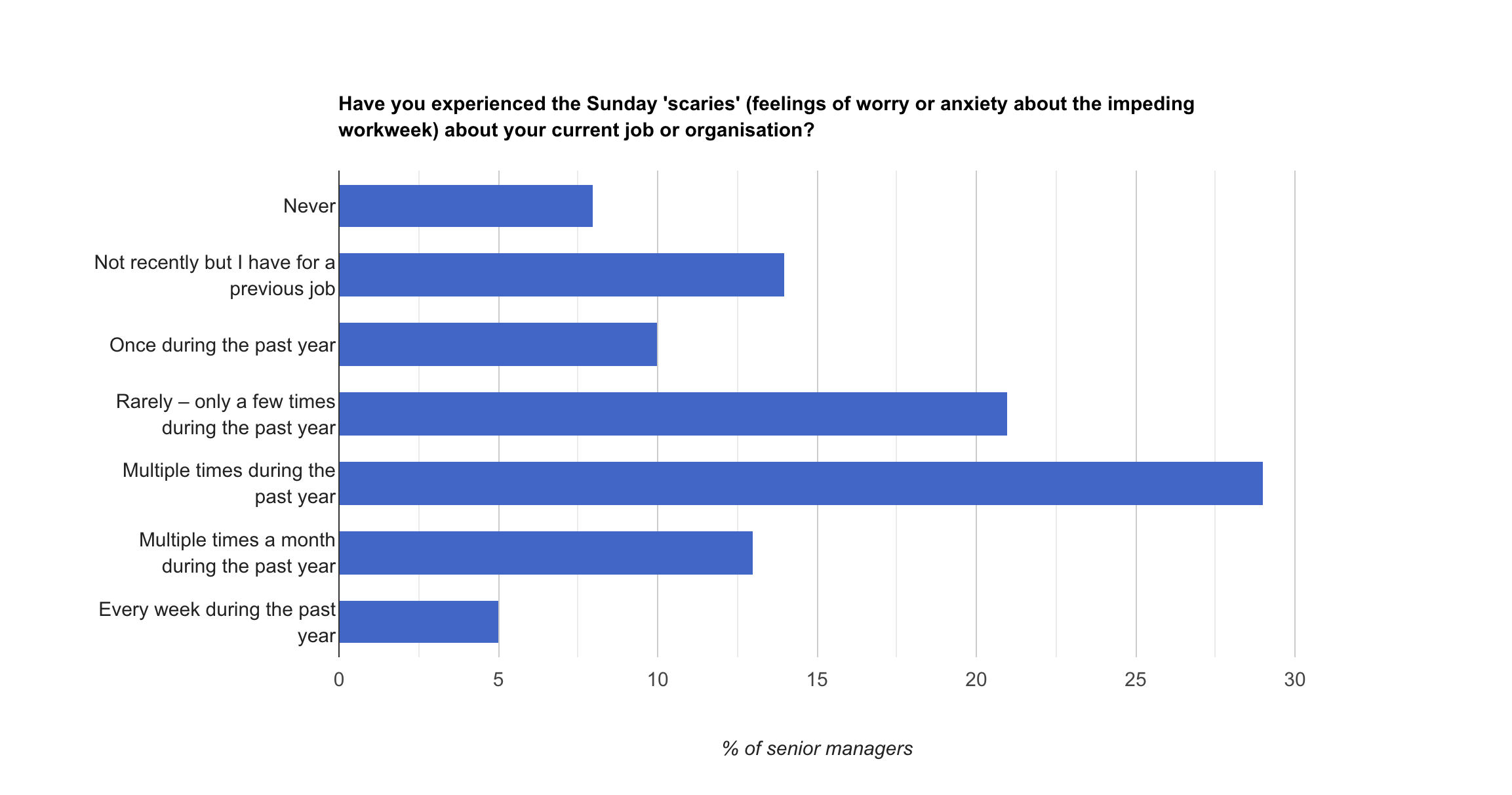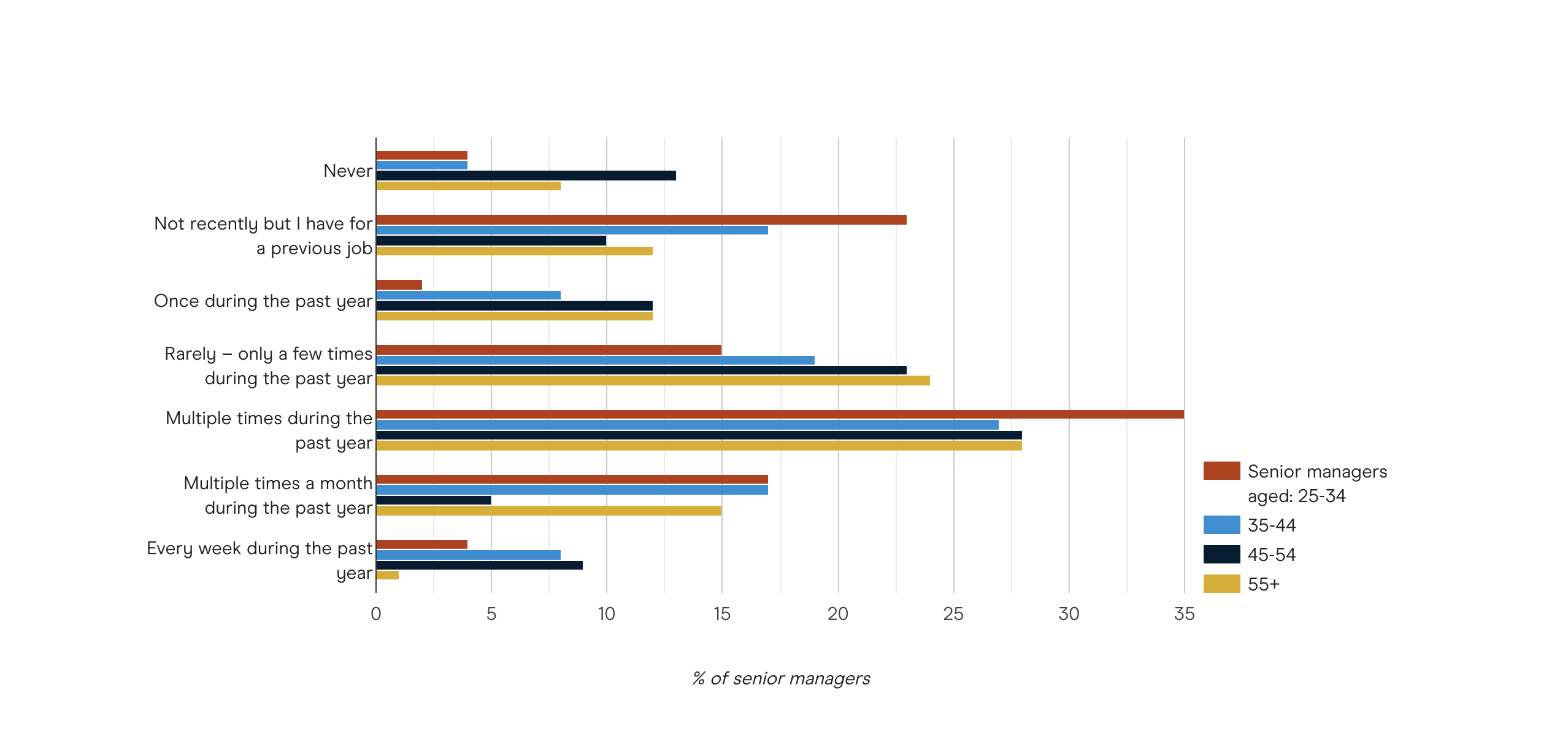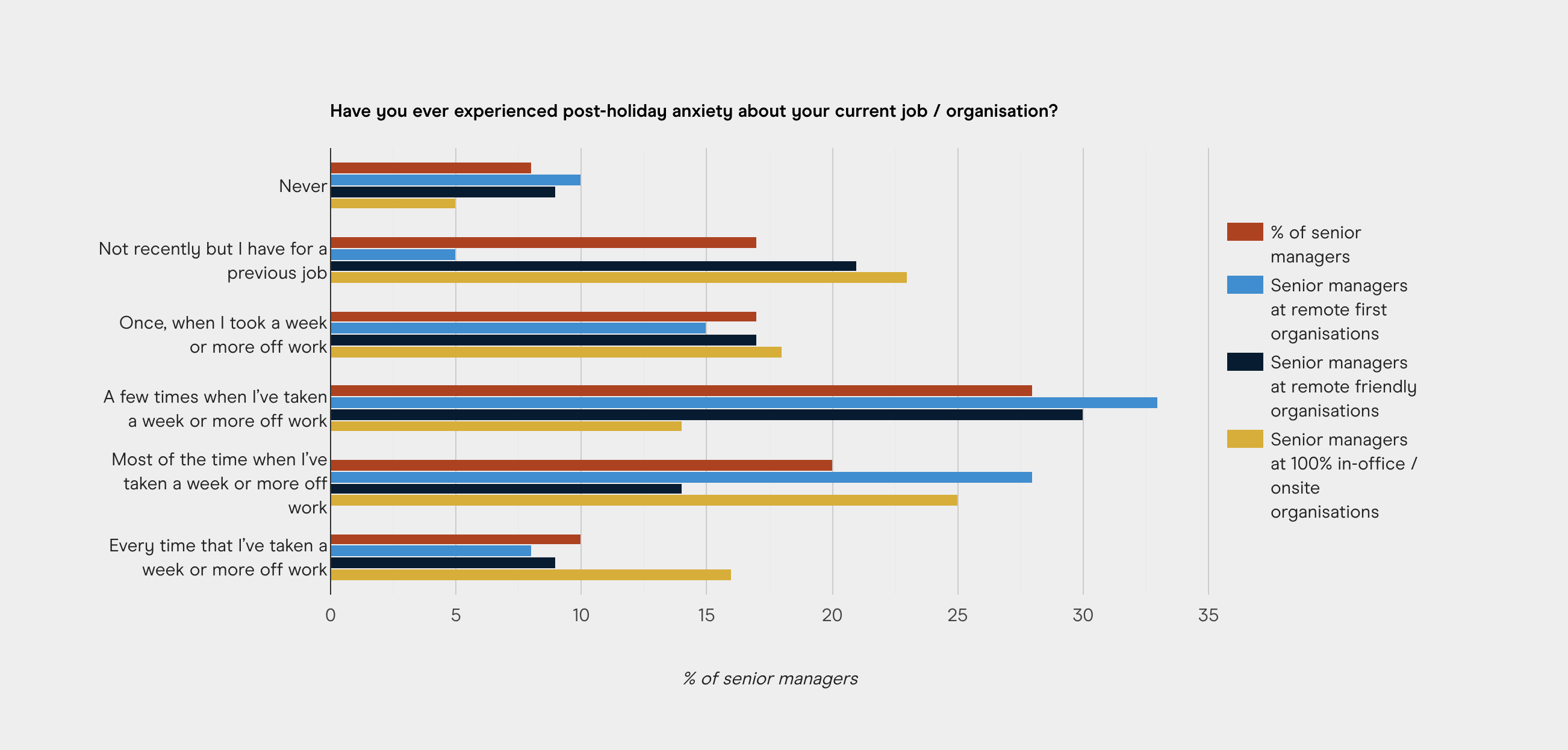HR software provider Ciphr polled 265 people who work in senior management and leadership roles at UK businesses, with 100+ employees, to find out what types of things cause them the most stress at work.
The research suggests that almost all (98%) senior managers are stressed by at least one thing at work, while two-fifths (83%) are affected by three or more work-related stressors (the average per person was eight).
Ciphr’s research also revealed that nearly one in two (47%) senior managers report experiencing the ‘Sunday scaries’ – feelings of anxiety about the impeding workweek – multiple times during the past year. Of those, around one in eight (13%) have felt this way multiple times a month, and 5% experience it every week.
Only 8% of survey respondents said that they had never experienced the Sunday scaries (also known as the Sunday Blues), while 14% haven’t experienced it recently, during their current jobs.
The full results are below, or follow this quick link to find out the top causes of stress for senior managers in 2023.
Top 15 causes of workplace stress for senior managers that frequently experience the ‘Sunday scaries’
Ciphr analysed the results of the survey respondents that reported feeling stressed about their impeding workweek relatively frequently (including those that got the Sunday scaries multiple times over the past year, multiples times a month, and every week) to find out the most common causes of their workplace anxiety. (The full results for all survey respondents are here.)
According to Ciphr’s survey, the three things that stress out senior managers the most are the cost-of-living crisis, high inflation and rising prices, and burnout.
Causes of stress for senior managers that get the Sunday Scaries:
- High inflation and rising prices (34%)
- Cost of living crisis (33%)
- Exhaustion / burnout (27%)
- Workload and to-do lists (24%)
- Economic downturn (23%)
- Unfinished work tasks (21%)
- Pressure to perform well / expectations of others (20%)
- Job security / losing my job (20%)
- Long working hours (19%)
- Employee retention / staff turnover (19%)
- Wage inflation (19%)
- Business viability and profitability concerns (18%)
- Rising interest rates (18%)
- Managing other people / the people I manage (18%)
- Growing the business and generating new revenue (17%)
How often do senior managers experience the Sunday ‘scaries’?

‘Sunday Scaries’: female senior managers
‘Sunday Scaries’: male senior managers
By age:
Younger senior managers appear more likely to get the Sunday scaries more frequently than other age groups, with 54% of respondents aged 25 to 44-years-old experiencing this type of stress multiple times a month, compared to 42% of those aged over 45.
It is gen X senior managers, however, aged 45 to 54-years-old, that typically feel this way the most often. One in 11 (9%) of this age group said they suffered from the Sunday scaries every week during the past year (compared to 4% of senior managers aged 25 to 34-years-old, 7% of those aged 35 to 44-years-old, and 1% of those over-55).

By organisational size:
Workforce size also appears to influence the occurrence of the Sunday scaries. Based on the data from this survey, there is a correlation between the number of employees at an organisation and the number of senior managers that report experiencing the Sunday scaries – with senior managers at large enterprises potentially feeling this type of stress more frequently than those at medium-sized organisations.
One in four (24%) senior managers at organisations with over 1,001 employees said they got the Sunday scaries multiple times a month, compared to 11% of those at organisations with less than 250 employees and 15% of those with less than 500 employees.
Remote workers appear more likely to experience the Sunday 'scaries' than those who work in-person
Senior managers working at remote-first organisations are almost twice as likely to report experiencing the Sunday scaries multiple times a month than those at organisations that operate hybrid or in-person working.
What are the causes of stress at work for leaders and senior managers?
All 265 survey respondents were asked to share their biggest concerns about work – the things causing them the most stress / anxiety in their current jobs (regardless of whether they experienced the Sunday scaries or not). They could select as many or as few of the reasons that applied to them from a randomised list of 39 options (which also included 'nothing – I have no concerns', 'none of the above', and 'other' options).
98% of the leaders and senior managers taking part in the survey selected at least one stressor (83% selected at least three stressors each). The average number of 'causes of stress' selected per person was eight.
The cost-of-living crisis (30%), and high inflation and rising prices (29%), were identified as being the biggest causes of stress at work for senior managers, followed by exhaustion / burnout (22%), workload and to-do lists (20%), and unfinished work tasks (20%).
Managing other people, long working hours, and the expectations of an ‘always on and always there’ culture were also listed as key causes of workplace stress for women (chosen by 19%, 17% and 17% of female senior managers respectively).
Productivity problems, growing the business and generating new revenue, and employee development were also listed as key causes of workplace stress for men (chosen by 18%, 15% and 15% of male senior managers respectively).
The biggest causes of work-related stress and anxiety, according to different generations of senior managers
Age also appears to influence which things cause senior managers the most stress and anxiety at work.
Over two-fifths (44%) of senior managers aged 25 to 34-years-old name the cost-of-living crisis as their biggest cause of stress in the workplace, followed by burnout and workload (25% and 23% respectively).
In comparison, senior managers a few decades older (aged 55+) are more likely to be stressed by high inflation and rising prices, and business viability and profitability concerns (33% and 24% respectively). The cost-of-living crisis is their third biggest stressor (23%).
Nearly a third (31%) of senior managers aged 35 to 44-years-old worry about the cost-of-living crisis, rising prices, and burnout equally. This age group is also are more likely to cite unfinished work tasks (27%) and long working hours (23%) as being contributors to their stress.
While most senior managers aged 45 to 54-years-old list growing the business and generating new revenue (24%), and productivity problems (23%), as being chief concerns, after high inflation and the cost-of-living crisis (37% and 29% respectively).
By working model
Remote working challenges are, rather aptly, a chief concern for one in five (22%) senior managers that work at remote-first organisations. It is #6 in their top 10 things that cause them the most stress or anxiety in their job (in comparison, just 8% of senior managers at remote-friendly organisations list this as a worry).
They are also twice as likely to be stressed by ‘pressure to perform well’ than senior managers that don’t work remotely (18% compared to 9%).
Senior managers that work at office-first or workplace-based organisations, on the other hand, are more likely to cite managing other people, or the people they manage, as being contributors to their stress. A quarter (25%) of senior managers that work in the office name this as one of their biggest causes of anxiety (tied at #4 in their top 10 with long working hours), compared to around one in eight senior managers at remote-first or remote-friendly organisations (12% and 11% respectively).
Causes of stress at work: senior managers that frequently experience the Sunday scaries vs those who don't
Common stressors which appear to affect more senior managers that get the Sunday scaries frequently (ie multiple times over the past year, or more) than those that don’t get the Sunday scaries frequently, include the ‘pressure to perform well’ (20% compared to 10%), job security (20% compared to 10%), exhaustion / burnout (27% compared to 18%), long working hours (19% compared to 9%), their boss (16% compared to 7%), and conflicts at work (15% compared to 8%).
Post-holiday anxiety
Nearly a third (30%) of senior managers experience post-holiday anxiety (feelings of anxiety or sadness about returning to work after a break) about their current job or organisation most of the time when they've taken a week or more off work. One in 10 of those feel it every time that they’ve taken a week or more off work.
Interestingly, senior managers who work onsite are twice as likely as senior managers working at 100% remote or remote-first organisations to report experiencing post-holiday anxiety every time that they have taken a week or more off work (16% vs 8%).

Notes
Ciphr conducted an online survey (between 6-13 December 2022) of 265 UK adults working in senior management positions at organisations with at least 101 employees. Survey respondents are over 25 years old and hold the following job roles: owner or partner, CEO/president/chairperson, chief financial officer (CFO), director, C-level executive, or senior management.
Nearly half (45%) of the individuals surveyed run or are employed by organisations with 1,001+ employees, two-fifths (41%) have 251 to 1,000 employees, and one in seven (14%) have 101 to 250 employees.
Questions asked in the survey included: What are your biggest concerns about work? – What’s causing you the most stress / anxiety in your current job? ‘Nothing – I have no concerns’, ‘none of the above’, and ‘other’ options were provided among the randomised list of 39 available answers.
